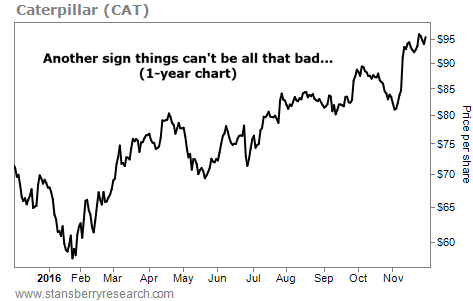| Home | About Us | Resources | Archive | Free Reports | Market Window |
One Way to Ensure You Won't Outlive Your RetirementBy
Friday, December 2, 2016
If you're worried about running out of money in retirement... you should be.
Consider this... Someone who is 65 years old today is expected to live to the age of 85. But when he was born, scientists expected him to only live to the age of 68. So right now, the average retiree is already 17 years "ahead of the curve."
As medical advancements continue, that gap could grow even faster... Already, life expectancy is increasing by an average of three months every single year.
Outliving one's retirement savings is the biggest fear of most people nearing retirement age. And it's a real concern.
More than half of Americans have less than $10,000 saved for retirement, according to the Credit Union National Association. And the New York Times estimates that nearly half of middle-class workers will be "poor or near poor" in retirement, living on a food budget of about $5 per day...
So imagine trying to milk those already sparse savings over 40 or 50 years.
The good news is that the solution to outliving your money isn't that complex. One type of investment offers real, guaranteed results...
I'm talking about annuities.
An annuity is a financial contract between you and an insurance company. In the simplest terms, you pay a large amount up front, and the company pays you back over the following years... either for a fixed number of years or until you die.
For example, a 60-year-old man can spend $200,000 today and, in return, receive $966 a month for life. That becomes a total of almost $290,000 in payments by the age of 85. The longer you live, the bigger the return on your investment principal.
Now, this can get more complex depending on how much of a payout you want and over what length of time. Annuities can be structured in many different ways. In the above example, the 60-year-old man chose what's called a "single premium fixed immediate annuity."
But many other variations are available...
First, answer these two questions...
If you want to start your income stream now, you want an immediate annuity. If you want to save for the future and you can afford to wait to collect, you want a deferred annuity.
Variable annuities involve investment risk, but they offer potential higher returns. Otherwise, you can simply accept a fixed rate. By selecting, combining, and adjusting these factors (and more), you can tailor the right annuity to your situation...
For example, a new retiree who wants a certain income stream right away might choose to invest in a fixed immediate annuity. Or, if you're saving for a future retirement, you might use a variable deferred annuity to participate in stock market gains while accumulating wealth you'll collect in later years.
Annuities can offer many unique benefits. One of the pluses of using a variable annuity is tax deferral.
Annuities aren't technically an investment... They are a contract you enter into with an insurance company (known as the "issuer"). This means you don't pay taxes along the way on your annuity's gains. Instead, your wealth will compound. (When you finally take your withdrawals, you'll pay taxes on those as income.)
Variable deferred annuities can also reduce market risk. If you retire at a down time in the market, you can end up with less than you had planned. But many variable annuities guarantee the safety of your invested capital, or even a minimum return if the market craps out.
There are also some downsides to consider. For example, annuities often have high fees to offset all of those benefits (although you can minimize the fees you pay by buying directly from companies instead of going through a salesman).
Annuities also lack liquidity. If you put your cash into one, you can't get it back whenever you want without penalties. If you buy an annuity that will pay for life, you may not get your money back if you don't survive long enough.
However, most annuities have a short period during which you can back out without penalties. After that, there are some circumstances under which you can make withdrawals (in excess of the income you're getting). And most annuities allow you to make special withdrawals if you need nursing home care.
The most important takeaway is this: Make sure you understand every detail of any annuity you purchase. You're the only one who knows what's right and what's best for you.
Annuities are an important and valuable tool for those in the right situation. For those folks, it may be the single best way to plan for retirement... and ensure they don't outlive their savings.
Here's to our health, wealth, and a great retirement,
Dr. David Eifrig
Further Reading:
Back in August, Doc shared some of his favorite income investments. Catch up on his five-part series here:
Market NotesANOTHER GOOD SIGN FOR THE GLOBAL ECONOMY Yesterday, we noted that the soaring share price of Thor Industries was a clear sign that the U.S. economy isn't in the dumps. But what about the global economy?
Today's chart of Caterpillar (CAT) gives us some insight...
Caterpillar – commonly known as "Cat" – is the world's largest maker of construction and mining equipment. These are the tools used to build bridges, airports, roads, shopping malls, homes, and more. Like Thor Industries, Cat's share price rises and falls with economic activity.
With the election behind us, investors are expecting massive infrastructure projects in the U.S. Caterpillar is a one-stop shop for everything the government needs to complete these projects... This year, investors have poured money into the stock, sending shares from $60 to $97, a new 52-week high. This gives us another reason to believe things can't be all that bad...
 |
Recent Articles
|



